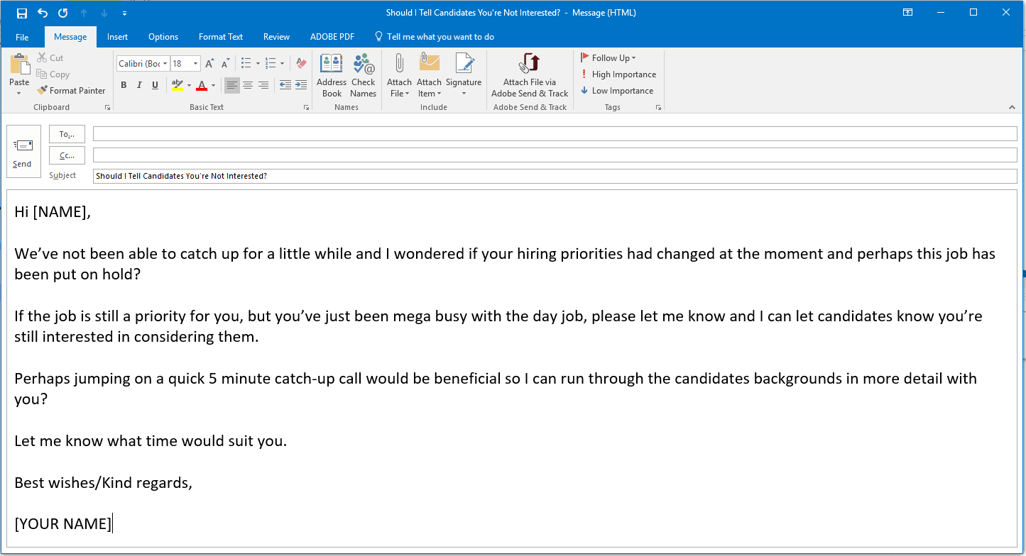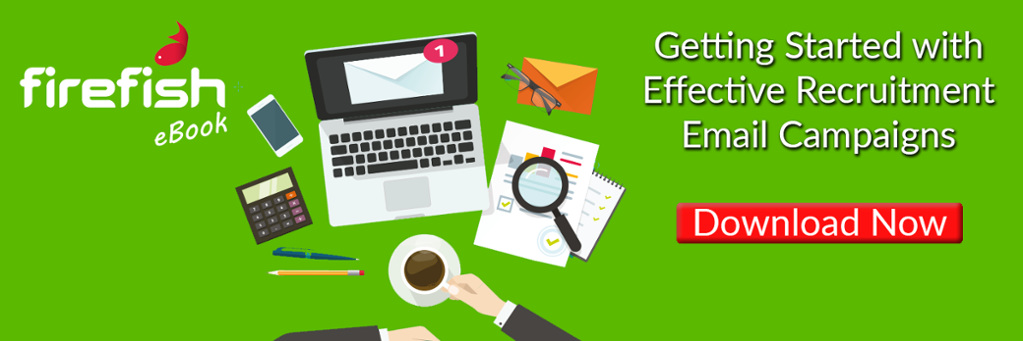You've done everything right: advertising the job, attracting lots of relevant candidates, and the client has a shortlist they're excited about. But now they won't answer your calls. They've gone AWOL and the whole process has ground to a halt.
So, how do you regain control? How do you create a sense of urgency and get momentum back on your side?
Here's a Tactic That Other Sales Professionals Use
 It's frustrating when a client isn't returning calls or emails after you've put a lot of time and effort into working their job. You've got candidates who want to know what's going on, and you need to know if you should invest more time into the process or put the job on hold (sometimes it really is worth letting go!).
It's frustrating when a client isn't returning calls or emails after you've put a lot of time and effort into working their job. You've got candidates who want to know what's going on, and you need to know if you should invest more time into the process or put the job on hold (sometimes it really is worth letting go!).
This type of scenario is familiar to sales people, too. Silence is the worst outcome for a sales exec so they use what they call a 'break up' email to encourage clients to respond. They send an email to clarify where the client is in terms of the sales process asking a simple question: 'Should I close your file or should I continue working on this deal?' This puts the ball in the client's court, and it encourages them to either continue with the sales process, or opt out entirely.
The Case for the Sales Email
At first, we were sceptical to say the least. But, we've used this email for the last couple of years and we're now converts! In 2016, our response rate from this email was 67% and it spurs prospects to just level with us and also it stops us from bugging them too. It almost always generates a lovely response from our prospects as they suddenly realise that we actually put a lot of work into evaluating their software needs. We put in a lot of effort into customising everything to their business, so it's only courtesy for our clients to send a quick email back letting us know what's happening.
Could This Tactic Be Used in Recruitment?
Now, you might feel a little apprehensive sending an email like this to your clients. Unlike sales, you’re not closing a relationship with a client – you’re clarifying the status of one job. So, keep in mind that the intention of the email is to jump start a conversation that’s stalled and to find a solution that suits both you and the client so you can continue working together in the future.
To help you regain momentum and control over the process, here's an email template you could try out:

When a client receives an email like this, they don’t feel affronted because what they read is: ‘Let’s not waste each other’s time. Help me to help you. We want to represent you and your brand, but we need to know it’s what you want too. We know you’re busy so we’re just sending you a gentle reminder: For us to continue working for you, we have to know you still require our services.’
You're also showing them you're busy too. Your time is valuable and for you to spend it on the client, they need to show they're still invested in filling the job vacancy. If the client doesn't respond, then you know to put this job on hold, update the candidates, and MOVE on to the next client that is motivated to fill a job and make you money. If they do respond, then you know the status of the job, good or bad, but this is a better outcome than silence and it might just be what you need to recover lost momentum with a client.
Why This Email Works
Sending this email creates a sense of urgency, and if a client is still interested in your recruitment services, they’re likely to respond quickly. They might just have been too busy and this email is often enough to get the conversation going again. Rather than ending a relationship with a client and moving on, this email creates a framework to get the entire recruitment process back on track. So, the next time a client stops returning your calls or emails, give this a go and do let us know how you get on!
Wendy McDougall
Wendy McDougall is Chief Fish of Firefish Software. In her spare time, you'll find her playing squash or feeding her inner geek with the latest technology!




